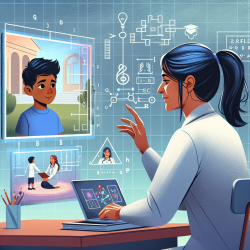Understanding the Genetic Basis of ASD
The study utilized Whole Exome Sequencing (WES) to analyze the genetic data of 33 children with ASD. Through advanced bioinformatics and machine learning methodologies, researchers identified specific genetic variants associated with different ASD phenotypes. These variants were linked to cognitive and linguistic impairments, such as non-verbal IQ, memory, attention, and oral language deficits.Key Findings and Their Implications
The study's linear regression polygenic risk score model achieved an 81.81% prediction accuracy in classifying ASD severity. This high level of accuracy underscores the potential of genetic data to inform clinical decisions. Notably, 14 genes were found to be present across all ASD sub-phenotypes, suggesting a common genetic foundation that influences various aspects of the disorder.How Practitioners Can Apply These Insights
Practitioners can use these findings to:- Tailor Interventions: By understanding the genetic underpinnings of a child's ASD, therapists can customize their interventions to target specific cognitive and linguistic deficits.
- Predict Outcomes: Genetic profiles can help predict the severity of ASD symptoms, enabling practitioners to set realistic goals and expectations for therapy.
- Encourage Further Research: The study highlights the need for larger datasets to validate these genetic markers as diagnostic tools. Practitioners can contribute to this research by collaborating with geneticists and participating in data collection efforts.
Future Directions
While the study provides valuable insights, it also underscores the complexity of ASD and the need for ongoing research. Practitioners are encouraged to stay updated on the latest genetic research and consider integrating genetic screening into their practice to enhance diagnostic accuracy and therapeutic outcomes.Conclusion
The integration of genetic insights into speech-language pathology offers a promising avenue for improving outcomes for children with ASD. By adopting a data-driven approach, practitioners can deliver more personalized and effective therapy, ultimately enhancing the quality of life for their patients.To read the original research paper, please follow this link: Novel clinical, molecular and bioinformatics insights into the genetic background of autism.










